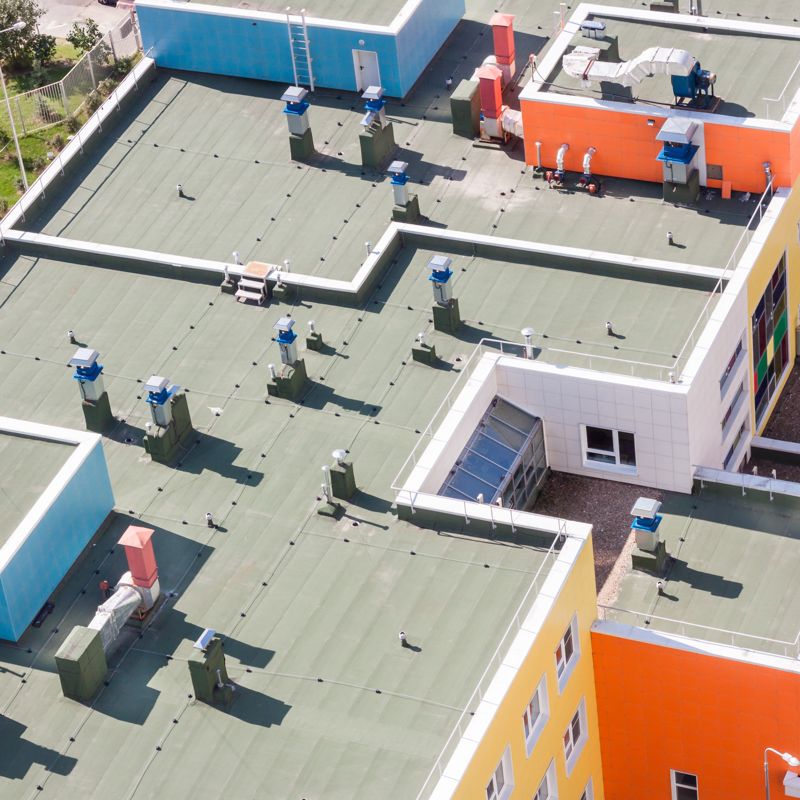
Low Slope Roofing in Dallas
Commercial Roofing Services in Dallas and Surrounding Areas
Looking for expert low-slope commercial roofing services in the DFW area? Arrington Roofing specializes in low-slope systems that are ideal for Dallas-Fort Worth's unique weather conditions, providing long-lasting durability and energy efficiency. Whether you’re managing a large retail property, an industrial facility, or an office building, your roof plays a critical role in protecting your business.
Our commercial roofing services are designed to meet the needs of businesses across the region. We understand that Texas heat, sudden storms, and unpredictable weather can take a toll on your roof, and that’s why we offer top-tier materials and expert installation to ensure your building stays protected year-round.
Our local knowledge allows us to deliver personalized solutions that are tailored to your specific property. If you're in need of low-slope roofing repair, replacement, or new installation, reach out today for a consultation and see how we can help your business stay covered! (214) 817-3274
What is Low Slope Roofing?
Low-slope roofing, commonly used in commercial buildings, refers to roofing systems with a slope of less than 3:12, meaning the roof rises less than three inches for every twelve inches of horizontal distance. This type of roofing is ideal for larger buildings like warehouses, retail spaces, and office complexes due to its cost-effectiveness and practicality. At its core, low-slope roofing is designed for efficient water drainage while offering extensive coverage for large areas. We often recommend low-slope roofing for businesses because of the many benefits it offers:
- Cost-Effective Installation: Due to its simpler design, low-slope roofing typically requires less material and labor, reducing installation costs.
- Energy Efficiency: Many low-slope systems can incorporate energy-efficient materials like cool roofing or reflective membranes, reducing cooling costs—especially in warm climates like DFW.
- Easier Maintenance: The flat surface allows for easy access, simplifying maintenance tasks like inspections and repairs.
- Durability: Modern low-slope systems, such as TPO, PVC, and EPDM, are designed to withstand harsh weather conditions, including heavy rains and extreme sun exposure, making them a reliable option for businesses.
If you're looking to protect your business with a durable and cost-efficient roof, low-slope roofing might be the right choice! Reach out to our team for a consultation and find the best solution for your commercial property. (214) 817-3274

Why Choose Arrington Roofing?
The Last Roofer You Need to Call
-
Contact Us for a Free EstimateGet started by giving us a call and setting up a free estimate.
-
Ask About Our WarrantyTalk to our team about our roofing services warranty!
-
Convenient Financing Options
With approved credit. We offer a variety of options. Call to learn about the details.
-
Emergency Services AvailableRoofing emergencies can't wait. Call for immediate help.


-
"Worth it for their expertise & our peace of mind."
- Marty M.
Types of Low Slope Roofing
When it comes to low-slope commercial roofing, three of the most popular materials are TPO (Thermoplastic Polyolefin), PVC (Polyvinyl Chloride), and EPDM (Ethylene Propylene Diene Monomer). Each of these materials offers unique benefits tailored to specific commercial roofing needs. Here's a breakdown of each type and the advantages they bring to your business:
TPO (Thermoplastic Polyolefin)
- Energy Efficiency: TPO is known for its reflective properties, which help reduce cooling costs by reflecting UV rays away from the building.
- Durability: It resists dirt, mold, and punctures, making it an excellent choice for businesses in high-traffic or industrial areas.
- Cost-Effective: TPO tends to be more affordable than other materials while offering many of the same advantages, making it a popular choice for commercial buildings.
PVC (Polyvinyl Chloride)
- Chemical Resistance: PVC is highly resistant to chemicals, grease, and oils, making it perfect for industrial facilities or restaurants.
- Strong Welded Seams: PVC membranes are heat-welded at the seams, creating a watertight bond that enhances durability and leak protection.
- Long Lifespan: Known for its longevity, PVC roofing can often last over 20 years with proper maintenance.
EPDM (Ethylene Propylene Diene Monomer)
- Weather Resistance: EPDM performs exceptionally well in extreme weather, particularly in fluctuating temperatures, making it ideal for a variety of climates.
- Flexibility: It’s highly flexible, even in cold temperatures, reducing the likelihood of cracking or splitting.
- Proven Longevity: EPDM roofing systems have been used for decades and are known for their long-lasting performance, with some roofs lasting 30 years or more.
Which One is Right for Your Business?
Choosing the right material depends on your building’s needs, budget, and the specific environment it’s in. TPO is ideal for energy savings, PVC excels in areas exposed to chemicals, and EPDM is perfect for buildings in regions with extreme weather changes.
For expert advice on which low-slope roofing system will work best for your commercial property, contact us today for a consultation! (214) 817-3274
